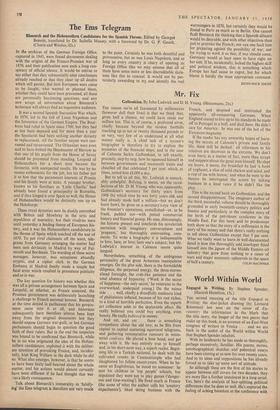Mr. Fix
Gulbenkian. By John Lodwick and D. H. Young. (Heinemann, 21s.) THE reason we're all fascinated by millionaires (however dull their lives) is that we think that, given half a chance, we could have made our million too. This is, of course, a profound error,- chiefly because beyond the modest foothills reaching up to ten or twenty thousand pounds or so very, very few of us understand at all what money really is. A chief task of a tycoon's biographer is therefore to try to explain the mysteries of the financial steps; and in the case of Calouste Sarkis Gulbenkian, to tell exactly, precisely, step by step, how he squeezed himself in between governments and mammoth trusts and chiselled off that celebrated 5 per cent. which, at times, netted him £8,000 a day.
But to tell us all this, Mr. Lodwick is remark- ably unhelpful. Relying, it seems,• on the recol- lections of Mr. D. H. Young, who was, apparently, Gulbenkian's secretary for thirty years from 1908 (by which time he was forty years old, and had already made half a million—but we don't learn how), he gives us a secretary's-eye view of the financier's operations, embellished—or, to be frank, padded out—with potted commercial history and financial gossip. He uses, distressingly, the historic present and interlards his novelettish narration with imaginary conversations and `pregnant,' but thoroughly unrevealing, com- ments. To write a biography it is indispensable to love, hate, or love/hate one's subject; but Mr. Lodwick's interest in Calouste seems quite languid.
Nevertheless, something of the ambiguous personality of the great Armenian manipulator emerges. On the plus side, there is the formidable diligence, the perpetual energy, the three-moves- ahead foresight, the crab-like patience and the total absence of hypocrisy. (Work is the secret of happiness—the only secret,' he reiterates to the overworked, underpaid young.) On the minus side . . . well, chiefly a dreadfully mediocre kind of philistinism inflated, because of his vast riches, to a kind of horrible perfection. Even the superb art collection adds to the deplorable effect. He really believed you could buy anything, even beauty. He really believed in money.
And yet, and yet . . . there is something sympathetic abOut the old boy, as he flits from capital to capital scattering equivocal telegrams, and gathering remunerative rumours in minis- terial coulisses. He played a lone hand, and got away with it. He was entirely true to himself and, in his short-term way, a superb realist. Begin- ning life as a Turkish national, he dealt with the cultivated crooks in Constantinople who had slaughtered his fellow countrymen. When he be- came an Englishman, he stood no nonsense : he sent his children to 'top people' schools, but stipulated they were not to play games (`danger- ous and time-wasting'). He lived much in France (the scene of what the author calls his 'amatory experiments'), liked doing business with the French, and despised and mistrusted the apparently all-conquering Germans. When England ceased to live up to his standards he made off to Portugal in a huff, and died there. He didn't care for America : he was one of the last of the European magnates.
If the reader has any unworthy hopes of learn- ing the secrets of Calouste's private and family life, these will be dashed : all references to his relatives are decorous in the extreme. We don't even learn, as a matter of fact, more than scraps and snippets about the great man himself. He slept six hours, it seems, for breakfast he had 'a bowl of yoghourt, a slice of cold chicken and salad, and a cup of tea with lemon,' and when he went to the theatre he interrupted the actors by talking business in a loud voice if he didn't like the play. . . .
This is the second book on Gulbenkian, and the second disappointment. The imaginary author of the third, successful, volume should be thoroughly grounded in early twentieth-century politics and finance and particularly in the complex story of the birth of the petroleum syndicates in the Middle East. For this book and its predecessor both show us that the story of a millionaire is the story of his money and that there's really nothing to tell about Gulbenkian except that 5 per cent. What we really want to learn in well-documented detail is how this thoroughly odd interloper fitted himself into the jigsaw of the Middle Eastern oil industry that grew from nothing to a cause of wars and major economic upheavals in the space






































 Previous page
Previous page